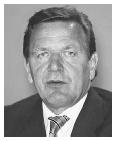GERMANY
Gerhard Schröder
Chancellor

(pronounced "GARE-hard SHROH-der")
"We want a new spirit in Germany, where people ask what they can do for their country."
The Federal Republic of Germany is situated in north central Europe and shares a border with Denmark to the north, Poland and the Czech Republic to the east, Switzerland and Austria to the south, and France, Belgium, the Netherlands, and Luxembourg to the west. From 1949 to 1990, Germany was divided into West Germany and East Germany; the two were unified through a treaty effective 3 October 1990. The total area is 357,021 sq km (137,847 sq mi), with an estimated population of 83.3 million inhabitants in 2002. Berlin is the capital and largest city.
Germany is a culturally and ethnically homogenous nation, with German being the official language. The population is comprised primarily of ethnic Germans with less than 10% of the population comprised on non-German ethnicities. The largest ethnic minority is the Turks (2.4%); other ethnicities include Serbo-Croatian, Italian, Russian, Greek, Polish, and Spanish. The country is predominantly Christian; in the north and east the majority is Protestant whereas in the south the majority is Roman Catholic.
Germany is a highly industrialized and urbanized country with the largest economy in Europe. Its major exports are construction machinery, vehicles, chemicals, iron and steel, textiles, fuels, and precision and optical equipment. Per capita gross domestic product (GDP) was estimated at US $26,200 in 2001. In 2002, the euro became the country's sole currency, replacing the deutsche mark (DM).
ADDRESS
Bundeskanzler
Adenaurerallee 141 5300
Bonn 1, Germany
Comment about this article, ask questions, or add new information about this topic: